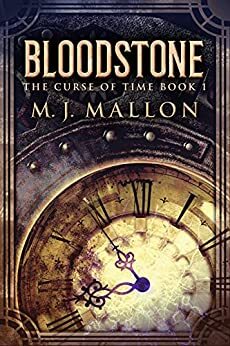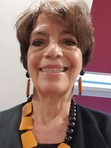Eva Hnizdo's Blog, page 5
October 3, 2021
Smorgasbord Cafe and Bookstore Update #Reviews – #Fantasy M.J. Mallon, #Poetry Elizabeth Gauffreau, #Suspense Joan Hall
Some of these books sound fun

Welcome to the first of the weeks Cafe updates with recent reviews for authors on the shelves.
The first review is for M.J. Mallon’s new release of Bloodstone (The Curse Of Time Book 1) – Book 2 is following shortly.
 About the book
About the book
Fifteen-year-old Amelina Scott lives in Cambridge with her dysfunctional family, a mysterious black cat, and an unusual girl who is imprisoned within the mirrors located in her house.
When an unexpected message arrives inviting her to visit the Crystal Cottage, she sets off on a forbidden path where she encounters Ryder: a charismatic, perplexing stranger.
With the help of a magical paint set and some crystal wizard stones, can Amelina discover the truth about her family?
A unique, imaginative mystery full of magic-wielding and dark elements, Bloodstone is a riveting adventure for anyone interested in fantasy, mythology or the world of the paranormal.
One of the recent…
View original post 1,294 more words
September 30, 2021
BBC interview went well
https://www.bbc.co.uk/programmes/m001...
i am not very well right now, so this is short. I haven't had time to update my reading, and haven't been reading much this month. I will !
September 28, 2021
Two Viennese book-lovers

Above, Richard Flatter with my infant father The internet brings unexpected connections. It led the other day to my drinking coffee with a writer whose family had crossed paths with mine in Vienna two generations ago. Dudley Curtis had read about my Jewish family in Uncle Otto’s Puppet Theatre, and is himself about to write […]
Two Viennese book-lovers
Exciting week -book and a BBC Radio 4 Interview
It’s all happening, official British launching of my book, my BBC Radio 4 interview.
On 28th September, my book will officially be published in th UK. There is also a possibility to review the book on the publisher’s site. The book has already been available in the USA since 5th August.
https://www.bookguild.co.uk/bookshop/book/288/Why%20Didn’t%20They%20Leave%3F/
So whoever is kind enough to want to review my book on Amazon, Goodreads, Book Guild please do so. I usually copy and paste my reviews to all those sites. Can’t wait to read what people thought!
On Wednesday 29th September, my BBC Radio 4 interview will be broadcast at 9.30 UK time and 20.45 UK time, it will also be available as a podcast. I was nervous, but the producer Sheila Cook and the presenter Olly Mann made it easier for me by their friendly kind approach.
Here is the link:
September 23, 2021
I am very excited
I KNOW it is only New Jewish fiction but still!
https://www.amazon.co.uk/gp/new-relea...
I am very excited
I KNOW it is only New Jewish fiction but still!
https://www.amazon.co.uk/gp/new-relea...
September 19, 2021
Mystery and pitfalls of Amazon book reviews.

September 11, 2021
Some readers like my novel, will my relatives like it, too?
I can’t wait for my readers to review the book on Amazon and Goodreads, but because of Amazon’s rules it can’t be before 28th September, and even then people shouldn’t rush because apparently when too many people try to review the book on the same day, Amazon gets suspicious. So I have to be patient. Not my forte!
My publisher received these 3 wonderful short comments about my novel from 3 writers I asked for review.
With meticulous detail, heartwrenching scenes like “ . . . marching us from Auschwitz to Loslau,” sear onto the page.
From police informers to the “Velvet Revolution,” Hnizdo offers answers through her characters’ actions as to why some
chose to remain in their homeland and others fled. A story filled with history and heartache . . . survival and hope.”
—Julie Maloney, author and founder/director of Women Reading Aloud
“Zuzana is haunted by the choices that her family made during the Nazi invasion of Czechoslovakia and later during the Communist regime. Her discoveries make for a compelling story of loyalty, love, and courage.”
Jacqueline Sheehan author
Eva Hnizdo has turned her own story into a gripping work of fiction that follows a secular Czech Jewish family’s fortunes during World War Two through communism to a multi-cultural life in Britain. Her book says much about prejudice and tolerance, survivors’ guilt and the emotional challenges of motherhood, all through the voice of her extrovert and sexy heroine.
Brigid Grauman author
And this week, I had a lovely note from a fellow writer from New York :
Just finished your book and wanted to let you know how much I enjoyed it.
As someone who often writes about Holocaust survivors and their children, I know how difficult it can be to handle this material in a sensitive manner that appeals to all types of readers–Jewish, non-Jewish, and people without personal involvement in this story.
You really pulled it off.
And now I wonder what my relatives will say when they read my novel, full of real family stories they know.
I just had a zoom call with a 95-year-old relative who lives in New Rochelle. She emigrated age 12 with her parents from Prague to New York in 1938. We spoke for an hour. She just got my book and started to read it. But we spoke about the past, and she told me many stories of what happened to various members of my family. She is smart, with a sense of humour, pleasure to talk to.
She told me many things I didn’t know. Maybe I should write another book…
My novel made my relatives closer; we communicate more. In the beginning, I was scared and wrote them an apologetic email:
This is what I wrote
What I would like to tell you that is that it is fiction, but I used and fictionalised many family stories.
You will recognise those stories, and I hope you won’t be angry about my interpretations and changes. I repeat, the book is fiction.
Many of you helped me by telling me about the past. Thank you!
The dedication of my book is :
I would like to dedicate this novel to my many relatives whom I never met because they were killed by the Nazis.
This letter is to ask you , if you read my book, to forgive me if you feel I misinterpreted the past.
It is a novel, nothing more.
Love Eva Hnizdo
The relative I spoke to today is the Miriam in my book, her stories, but I made Miriam an only child, and the real one has a brother. He didn’t mind, he’s reading my book at the moment, too.
I am curious what they will say.
Well, they can’t get angry IT IS FICTION !
The picture is an old photo of my family before the war, many of them were later killed by the Nazis.

September 6, 2021
beautiful blurbs from 3 writers to my publisher
My novel is being published on 28th September, but it is already available in the USA although you can only pre-order it in the UK.
These are 3 blurbs for my book by 3 writers.. who wrote wonderful books.
They are so kind! I hope other readers will like my book, too. Although some people already read it, it’s not possible to put an Amazon review till after 28th September,
All those kind words on social media are exciting.
—Julie Maloney, author and founder/director of Women Reading Aloud
With meticulous detail, heartwrenching scenes like “ . . . marching us from Auschwitz to Loslau,” sear onto the page.
From police informers to the “Velvet Revolution,” Hnizdo offers answers through her characters’ actions as to why some
chose to remain in their homeland and others fled. A story filled with history and heartache . . . survival and hope.”
Jacqueline Sheehan author
“Zuzana is haunted by the choices that her family made during the Nazi invasion of Czechoslovakia and later during the Communist regime. Her discoveries make for a compelling story of loyalty, love, and courage.”
Brigid Grauman author
Eva Hnizdo has turned her own story into a gripping work of fiction that follows a secular Czech Jewish family’s fortunes during World War Two through communism to a multi-cultural life in Britain. Her book says much about prejudice and tolerance, survivors’ guilt and the emotional challenges of motherhood, all through the voice of her extrovert and sexy heroine.
September 3, 2021
Why I will never forget 21st August 1968
 Every year on 21st August, all my Czech and Slovak friends remember this. This is a chapter from my book.
Every year on 21st August, all my Czech and Slovak friends remember this. This is a chapter from my book.Soviet invasion
21 August 1968, the Soviet Bloc armies invaded Czechoslovakia. Thirty years later, I talked about it with my son Adam. He was 11 then.
“So, what did the Czech army do? Did many people die?”
“No, Adam, there was no fighting. The radio was asking everybody to keep calm. People were demonstrating, shouting in Russian at the soldiers on tanks to go home. There was a pop song we were all singing, telling the Soviet soldiers to go home, that our girls don’t love them.”
“Did you sing it? And demonstrate?”
“I remember approaching the tanks in our street. I wore a tiny miniskirt; I was 15. The soldiers flirted, but I just made a face and said, ‘Idite domoj.’”
“Go home.” Adam repeated the Russian. He was electrified; he got up from his chair and started pacing the room. “Were you scared, Mum?”
“No, the soldiers seemed confused. They were told the Czechoslovak people and government were asking for help against counterrevolutionaries. They expected to be welcomed. In Prague, they randomly shot bullets at highly decorated 19th-century buildings. Maybe they thought these were palaces? One was the National Museum on Wenceslas Square. You know you said once that grandma’s house looks like a little castle? They shot at it, too.”
I remembered that growing up, I didn’t used to like the house we lived in. It had 19th-century architecture with little gargoyles and gothic arches; I learnt to like it later. I suppose it is now aged enough to be beautiful.
I told Adam that we had been on holiday in the mountains at the time of the invasion. My grandmother Franzi was with us. I remember hearing about the invasion on the radio. I cried.
“When we came back to Prague three days later, the window in my room was broken by the shots. The glass-fronted small bookcase above my bed had bullet damage, the glass shattered all over my bed, and I retrieved a bullet embedded in my Czech copy of Alice in Wonderland. I still have that book.”
Adam was listening, open-mouthed. “You could have been shot, Mum!”
“Everything was changing – censorship and propaganda in schools were reintroduced and the Soviet army left some of the soldiers behind ‘temporarily’.
To us nothing was more permanent. ‘Temporary like the Russian army’ meant forever. The invasion was now described as ‘Brotherly help aimed to prevent an invasion by NATO.’ I was 15. After the Soviet invasion, I pestered my mother to emigrate. But she told me she was too old and that she couldn’t abandon her mother.”
“Why didn’t you all go?” asked Adam.
“We could, but Grandma was quite frail, and your Grandma Magda wouldn’t leave without her.”
“But you emigrated later, Mum, on your own, right?”
I didn’t tell Adam that my main reason for emigrating four years later was to not to be with my mother.
“Grandma Magda was only 40 when the invasion happened. I could have grown up in the West. France, USA, Canada, even Israel. Our relatives abroad would have helped us.”
I blamed my mother for it for years, for not being brave. But I did not understand the bond she had with her mother. They had already lost too many people.
I told Adam about the two students, Palach and Zajic, who burned themselves in a protest against the invasion. We all went to Palach’s funeral. It was one of the last demonstrations to be allowed. We walked slowly; most of us were crying. Mother tried to stop me going, as she was afraid I might get into trouble. But I got used to not obeying my mother.
Then Adam suddenly came closer, hugged me and said, “If you emigrated then, and not later, you would have never met Dad, and I would never exist.”
I kissed him and said, “I am glad you exist, my darling.”
“Oh, may I have a hug, too?” asked my husband Harry, walking to the room.
“I was just telling Adam about 1968 and the invasion.”
“Mum could have been shot, but instead, the Russians shot Alice in Wonderland, Daddy.”
I had never told Harry about it, so I had to start again. Adam kept interrupting, telling the story for me, but when he kept asking about 1968, Harry said, “Come on, Adam, it was 30 years ago.”




